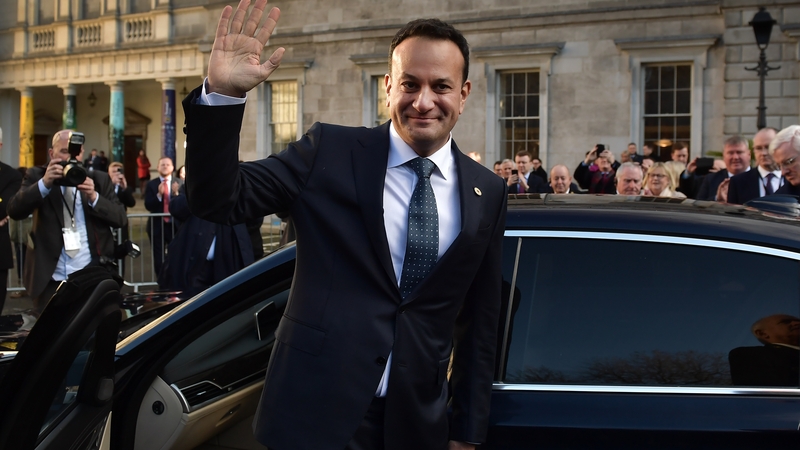In 2020, Fine Gael won 35 seats in the Dáil. It now has 33, having lost two TDs.
In 2021, the former minister Eoghan Murphy resigned.
He denied that his performance while at the helm of the Department of Housing had ultimately forced him out.
The following year, Donegal TD Joe McHugh, a former minister for education, lost the party whip over his stance on the mica crisis.
Of the 33 remaining Fine Gael deputies, more than a third - 12 - are also departing the political stage.
Leo Varadkar
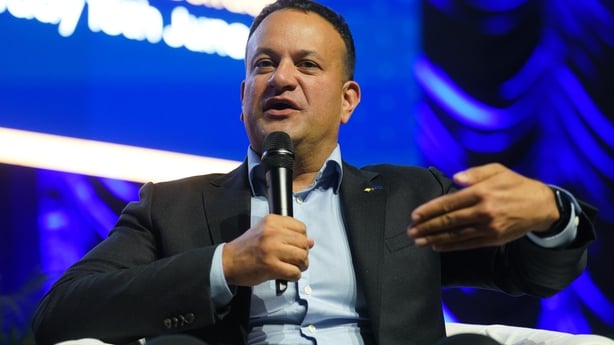
In 2017, a decade after he entered the Dáil, Leo Varadkar became taoiseach.
It was a watershed moment.
In 2015, he had come out in an interview with RTÉ's Miriam O'Callaghan, telling her: "I am a gay man. It's not a secret".
Unusually straight-talking, he was the first gay or mixed race person to lead the country, and aged 38 (at that point) the youngest ever taoiseach.
The speech he delivered from Washington DC in 2020 arguably helped to reassure an anxious nation that it would get through the coming Covid-19 storm.
When Leo Varadkar returned for a second term as taoiseach in 2022 - at the helm of an historic coalition with the old foe Fianna Fáil - he was facing steadily mounting criticism that his capacity to deliver had not matched his early promise.
All eyes are on what he does next.
Simon Coveney
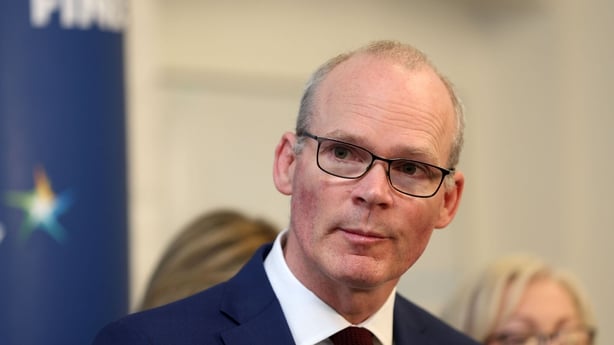
Another soon-to-be ex-TD expected to have a second career, Simon Coveney lost his leadership bid to Leo Varadkar in 2017 - despite winning the majority of the party membership.
In 2010, as the party had neared the end of a long stint in opposition, both men had supported a failed heave against Enda Kenny.
The apex of Simon Coveney's subsequent 13 years in cabinet came during his five year term as minister for foreign affairs (which included three as Tánaiste), and his stewardship of the vexatious and labyrinthine Brexit negotiations,
The low point was what he called the "political fiasco" he provoked by giving former cabinet colleague Katherine Zappone a UN role, which he had to withdraw and apologise for.
John Paul Phelan
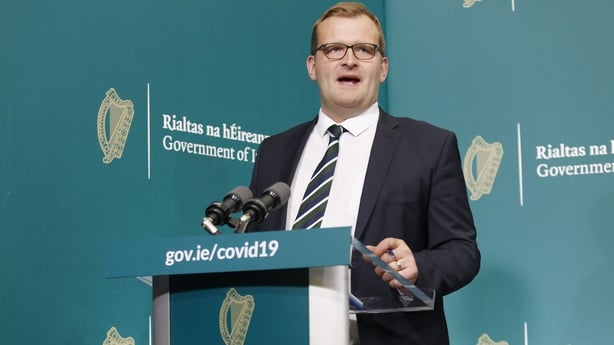
Carlow-Kilkenny TD John Paul Phelan suffered a heart attack in 2020, and cited his ongoing recovery when he decided not to stand again.
He had served almost a decade in the Seanad before being elected to the Dáil in 2011.
He was not reappointed as minister of state at the department of housing after the last election, perhaps the result cooling relations with Leo Varadkar, whose leadership bid he had supported in 2017.
David Stanton
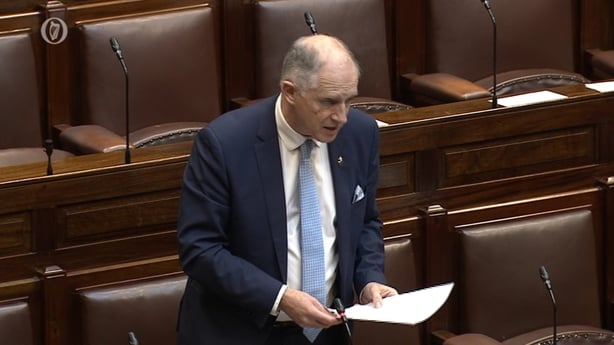
In May, Cork East TD David Stanton became the fifth Fine Gael deputy to announce that he would not seek re-election, as the trickle of exits became a rush for the door.
First elected in 1997, he held onto his seat when Bertie Ahern oversaw a Fine Gael rout in 2002 when the party lost almost two dozen seats.
Deputy Stanton later served as minister of state at the department of justice.
Richard Bruton

Last September, news that this party stalwart and one-time big gun was stepping down was an early warning that Fine Gael might be in trouble.
He was first elected in 1982, and unsuccessfully led the heave against Enda Kenny in 2010.
But he went on to serve in cabinet for most of the 2010s, including as minister for enterprise, a post he had held in the rainbow Coalition of the 1990s, led by his brother John Bruton, who passed away earlier this year.
In February, Richard Bruton gave a heartfelt tribute in the Dáil to his sibling and former taoiseach.
Josepha Madigan
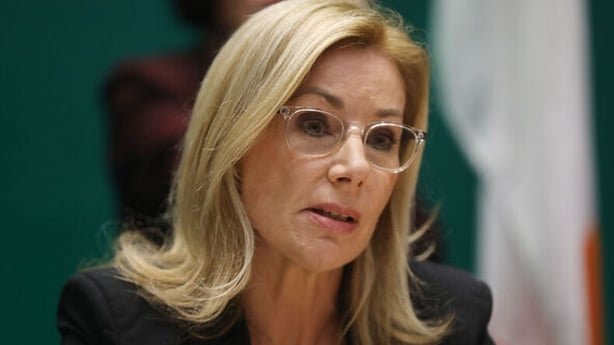
In May, Josepha Madigan became the eleventh Fine Gael TD to announce their retirement.
She won a seat in Dún Laoghaire-Rathdown in 2016, and the following year entered cabinet as minister for culture, heritage and the gaeltacht, followed in 2020 by a stint as a minister of state.
After deciding to leave the political stage, Deputy Madigan pointed to social media abuse and warned of the fragility of democracy.
Ciarán Cannon
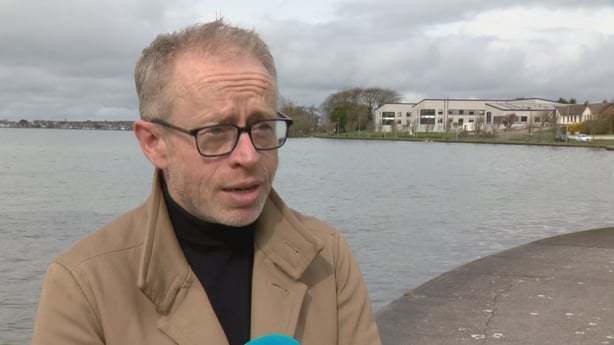
The one-time (and last) leader of the Progressive Democrats, Ciarán Cannon made the most pointed reference to an issue which has influenced many politicians' decisions not to run again - the "toxicity in politics".
Having served a term in the Seanad, the TD for Galway East has held his seat since 2011, and had two stints as a minister of state.
Looking back over the past two decades, he said that there is a "coarseness, a toxicity in politics now that was barely palpable" when he started out.
Brendan Griffin

The youngest of the TDs who are not contesting the next election, Brendan Griffin was elected in Kerry in 2016, and appointed as a minister of state in 2017.
He quickly silenced speculation that he might reconsider his decision not to run again when Simon Harris took over as Taoiseach (but said that he would consider a ministerial post - if one were offered).
Charlie Flanagan

First elected in Laois in 1987, Charlie Flanagan was one of the many Fine Gael casualties of the unstoppable Bertie Ahern behemoth in 2002.
But once he got his seat back in 2007, he never let it go (as of the last election, the constituency has been redrawn as Laois-Offaly).
The former minister for justice announced his decision not to run again last September, just weeks after Richard Bruton had dropped his bombshell.
Another party heavyweight, Brexit erupted during Charlie Flanagan's tenure as minister for foreign affairs, before he was succeeded by Simon Coveney in 2017.
Fergus O'Dowd

Fergus O'Dowd had served a decades-long career in local Louth politics - first for Labour and then Fine Gael - before being elected to the Dáil in 2002, followed by a decade on the opposition benches.
When his party finally chased Fianna Fáil out of Government Buildings in 2011, he was appointed as a minister of state for a term.
In the Dáil, Deputy O'Dowd has been a vocal opponent of the Government's decision to use Drogheda's largest hotel to exclusively house asylum seekers.
Paul Kehoe
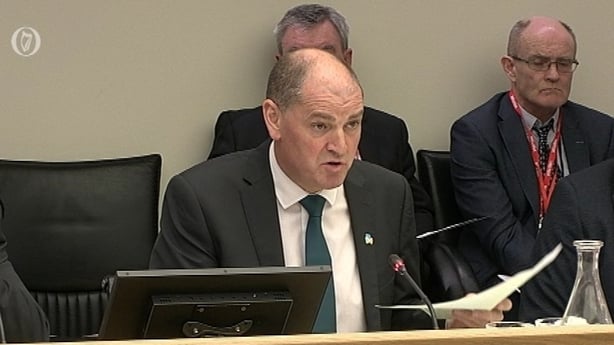
Another TD who bucked the trend to get elected during Fine Gael's annus horribilis of 2002, Paul Kehoe has served as minister of state at the department of defence and as government chief whip.
While he said that he is getting out of politics to spend more time with his family, Deputy Kehoe also pointed to social media toxicity.
Michael Creed

Like Simon Coveney, Michael Creed is a Cork TD (he is Cork North West; Simon Coveney is Cork South Central) and a former minister for agriculture.
Both had fathers in politics, too. Donal Creed was minister of state in 1981. Both men also supported the failed bid to oust Enda Kenny as party leader.
Announcing his decision, Deputy Creed said: "Politics by its nature requires renewal, and it's time for me to move on".
Eoghan Murphy
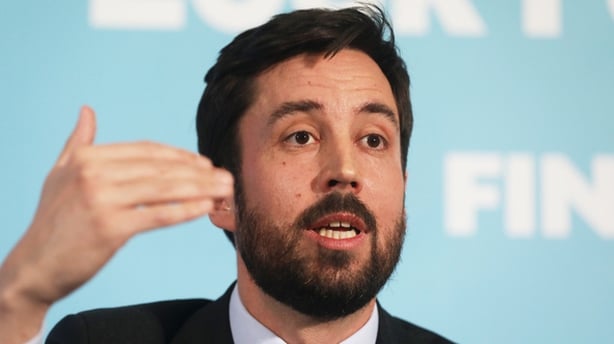
Having spearheaded Leo Varadkar's successful leadership campaign, Eoghan Murphy was given the reins of the Department of Housing in 2017.
He was not reappointed after the 2020 election, where the lack of housing had emerged as a prominent issue.
Eoghan Murphy's resignation the following year triggered the first byelection of that Dáil term (which ultimately resulted in the new Dublin Bay South TD Ivana Bacik emerging as leader of the Labour party).
He conceded that controversial remarks he had made as minister in support of "co-living" arrangements - where tenants share facilities, including bathrooms and kitchens - had been "stupid".
Mr Murphy expressed a desire to explore international affairs and nuclear disarmament.
Joe McHugh
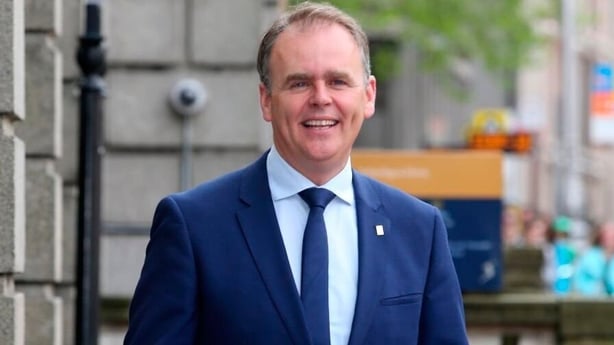
In 2022, at the height of the mica crisis, Donegal TD Joe McHugh, a former minister for education, lost the party whip over his stance on the issue.
He has continued to speak out for homeowners.
Before the Dáil rose for the recess, Deputy McHugh called for a 10% hike in compensation awarded under the Defective Concrete Blocks Scheme.
Following the elevation of Simon Harris to Taoiseach, there have been unconfirmed reports in local media of party efforts to get the deputy back on side.
Regardless, he has ruled out contesting the next election.
